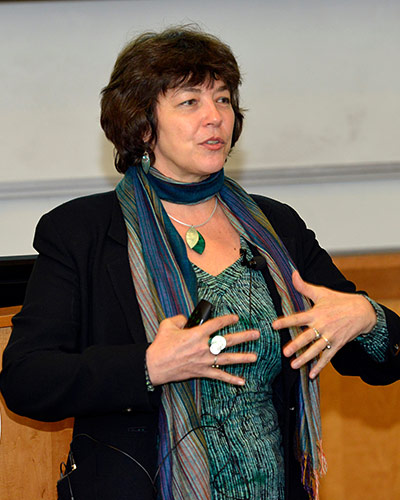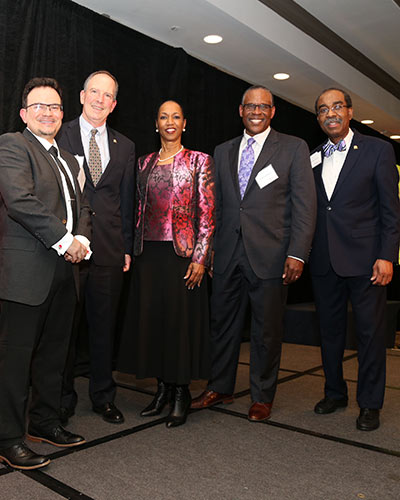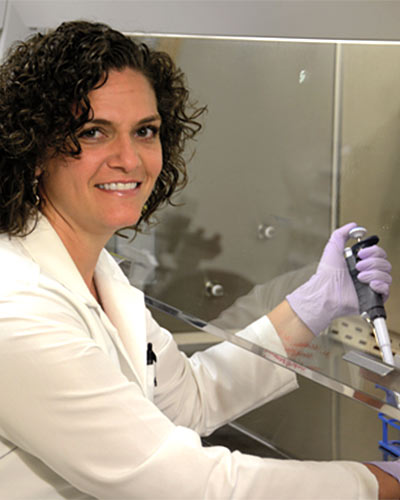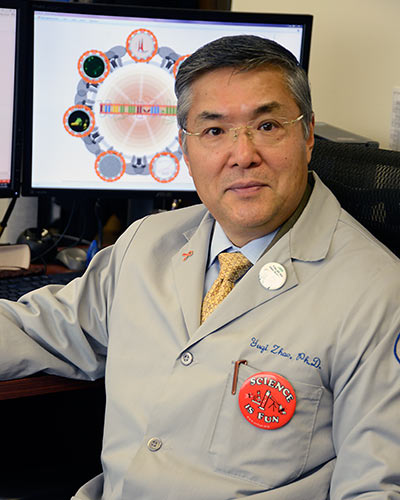March 29, 2019

Internationally Renowned Researcher Shares Multidisciplinary Approaches to Study the Control of Dengue and Zika
Eva Harris, PhD, never met a mosquito she didn’t like. A Professor of Infectious Diseases and Vaccinology and Director of the Center for Global Health at the University of California, Berkley, Dr. Harris was recently the guest speaker at the University of Maryland School of Medicine’s (UMSOM) Dr. Aaron I. Grollman Visiting Professorship in Basic Sciences Lectureship, where she shared her research on the control of Zika, dengue, and chikungunya—the most prevalent mosquito-borne diseases in humans. She is also the Co-Founder and President of the Sustainable Sciences Institute (SSI), an international non-profit dedicated to developing sustainable local research and public health systems in resource-poor settings.
The two-day Grollman Visiting Professorship Lectureship was established in 2007 by the Dr. Aaron I. Grollman Visiting Professorship and Graduate Program in Life Sciences (GPILS). The annual lectureship brings distinguished and internationally renowned scientists to engage the UMSOM community on the critical health issues and challenges of our time.
 “Dr. Harris is a dedicated mentor, dynamic student-centered speaker, and a valued colleague,” said Bret Hassel, MD, Associate Professor of Microbiology and Immunology and Director of the Graduate Program in Molecular Microbiology and Immunology. “We are honored to have Dr. Harris share her latest work in public health and research in infectious diseases.”
“Dr. Harris is a dedicated mentor, dynamic student-centered speaker, and a valued colleague,” said Bret Hassel, MD, Associate Professor of Microbiology and Immunology and Director of the Graduate Program in Molecular Microbiology and Immunology. “We are honored to have Dr. Harris share her latest work in public health and research in infectious diseases.”
Dr. Harris has developed a multidisciplinary approach to study the molecular virology, pathogenesis, immunology, epidemiology, clinical aspects and control of these mosquito-borne viruses. Her work investigates viral and host factors that modulate disease severity and immune correlates of protection and pathogenesis, using in vitro approaches, animal models and research involving human populations.
“We are bringing evidence to communities so that they can come up with their own ways to intervene in the mosquito-lifecycle,” Dr. Harris said.
In partnerships with scientists at the University of California, San Francisco’s Institute for Global Health Sciences, UC Berkeley and partner institutions including SSI, Dr. Harris has developed tools and technologies to prevent, diagnose, and treat topical diseases for neglected populations in Central and South America. DengueChat is one of these tools, which is a web and cell-phone based application used to motivate community members to remove dengue vector breeding sites.
“The problem with arboviruses is that they are transmitted by a mosquito that breeds in the most unlikely places,” she said. “The key factor is to identify those sites and eliminate them.”
Following the seminar, Dr. Harris and members of the GPILS community attended a reception. A Q&A luncheon was also organized for graduate students and postdoctoral fellows.
About GPILS
The Graduate Program in Life Sciences (GPILS) is a collaboration between the University of Maryland’s School of Medicine, Dental School and Graduate School. GPILS offers seven PhD granting graduate programs and four M.S. level programs.
The graduate programs consist of faculty in the basic science and clinical departments of the School of Medicine, School of Dentistry, School of Nursing, a wide array of internationally recognized research centers and institutes on campus, including the Center for Vaccine Development and Global Health, the Center for Vascular and Inflammatory Diseases, the Institute for Genome Science, the Maryland Psychiatric Research Center and the Institute of Human Virology, in addition to collaborations with other University of Maryland campuses.
About the University of Maryland School of Medicine
Now in its third century, the University of Maryland School of Medicine was chartered in 1807 as the first public medical school in the United States. It continues today as one of the fastest growing, top-tier biomedical research enterprises in the world -- with 43 academic departments, centers, institutes, and programs; and a faculty of more than 3,000 physicians, scientists, and allied health professionals, including members of the National Academy of Medicine and the National Academy of Sciences, and a distinguished recipient of the Albert E. Lasker Award in Medical Research. With an operating budget of more than $1 billion, the School of Medicine works closely in partnership with the University of Maryland Medical Center and Medical System to provide research-intensive, academic and clinically based care for more than 1.2 million patients each year. The School has over 2,500 students, residents, and fellows, and more than $530 million in extramural funding, with most of its academic departments highly ranked among all medical schools in the nation in research funding. As one of the seven professional schools that make up the University of Maryland, Baltimore campus, the School of Medicine has a total workforce of nearly 7,000 individuals. The combined School and Medical System (“University of Maryland Medicine”) has an annual budget of nearly $6 billion and an economic impact more than $15 billion on the state and local community. The School of Medicine faculty, which ranks as the 8th highest among public medical schools in research productivity, is an innovator in translational medicine, with 600 active patents and 24 start-up companies. The School works locally, nationally, and globally, with research and treatment facilities in 36 countries around the world. Visit medschool.umaryland.edu
Contact
Office of Public Affairs
655 West Baltimore Street
Bressler Research Building 14-002
Baltimore, Maryland 21201-1559
Contact Media Relations
(410) 706-5260
Related stories

Wednesday, October 19, 2022
University of Maryland SOP, SOM Awarded $1.1 Million Grant to Increase Diversity in Biomedical Workforce
The National Institutes of Health (NIH) has awarded a $1.1 million grant to the University of Maryland Schools of Pharmacy (UMSOP) and Medicine (UMSOM) to create a training program to enhance diversity in the biomedical workforce.

Tuesday, February 27, 2018
Faculty, Alumni and Student Honored at 11th Annual "Celebrating Diversity" Dinner
The University of Maryland School of Medicine (UMSOM) held its 11th annual “Celebrating Diversity” reception and dinner on Feb. 25, 2018 at the Baltimore Marriott Inner Harbor at Camden Yards. The event was attended by nearly 300 guests who gathered to honor diversity at UMSOM, recognize those who have helped increase diversity in the field of medicine, and to raise support for an endowed scholarship in the name of Dean Emeritus Donald E. Wilson, MD, MACP, AGAF.

Thursday, February 01, 2018
UMSOM’s Monica McArthur, MD, PhD. Discusses Zika Virus and Challenges in Developing a Vaccine
Zika vaccine development: two years on from the outbreak

Thursday, January 05, 2017
For the First Time, Researchers Identify Key Proteins That May Make Zika So Deadly
Until it burst onto the scene earlier this year, Zika was an obscure, little-known virus. As a result, scientists know little about how it works. Over the past year, they have learned that it can cause a range of dangerous health problems, including birth defects such as microcephaly and neurological problems such as Guillain-Barré syndrome. But they don’t know which Zika protein or proteins are causing harm, or exactly how these proteins cause damage.

Wednesday, October 12, 2016
The Zika Virus Threat and Vaccine Trial is the Focus of a Special Panel Discussion with Dean Reece and UMSOM Faculty Experts
Dean E. Albert Reece was joined by Center for Vaccine Development Director Dr. Kathleen Neuzil, and OB/GYN department chair Dr. Christopher Harman to discuss the threat of the Zika virus and the development of a new vaccine in a panel discussion hosted by Frontline Medical News.

Thursday, August 04, 2016
UM SOM is Center Stage in Testing National Institutes of Health Zika Vaccine
UM SOM'S Center for Vaccine Development, tapped previously for Ebola vaccine, now steps up to help develop first Zika vaccine.

Tuesday, February 16, 2016
The Baltimore Sun: Baltimore Consortium Forms Global Task Force to Study Zika, Find Vaccine
A Baltimore-based research consortium is forming a task force of leading scientists from around the world, including renowned AIDS researcher Dr. Robert Gallo, to better understand the Zika virus and quickly develop a vaccine.
